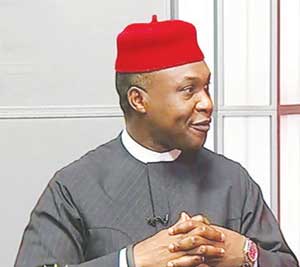…requires $50b to maximise potential
Aviation contributed $7 million (about N138 billion) to Nigeria’s Gross Domestic Product (GDP) last year, an improvement on the less than N120 billion it fetched in 2013.
Aviation Minister, Osita Chidoka, disclosed the figure at the Aviation Executive Business Forum 2015 held in Lagos, stressing that the industry is grossly under-utilised, as there are a lot of untapped opportunities in the sector.
He cited Lagos which is supposed to position itself as the hub of aviation in West Africa and make more money.
“We have weak corporate governance in the industry, poor incentives for private sector participation. Under utilised Bilateral Air Service Agreements (BASAs) and under financed domestic airlines are also part of the problem,” he added.
Chidoka, however, expressed optimism that the industry will recover with appropriate policies and incentives.
“That is just exactly what the Nigerian aviation industry needs. By introducing some initiatives, we are beginning to feel the pulse of the industry.
“Among other initiatives, we strongly believe that the industry also needs an economic stimulus to drive it even faster than expected.”
He said the key areas to focus on are aerodrome infrastructure and operation, airline operations and safety, as well as allied services, airspace management and manpower development.
African Airlines Association (AFRAA) Secretary General, Elijah Chingosho, lamented the plight of African airlines struggling to survive a competition dominated by global mega carriers.
Meanwhile, Aviation requires $50 billion investment inflow to fully maximise growth potential, according to Aviation Minister, Osita Chidoka.
He made the point at a business forum organised by the African Airlines Association (AAA) for existing and prospective investors in the sector.
In his view, the government alone cannot provide the resources that will grow the industry to create jobs and boost Gross Domestic Product (GDP).
Chidoka told prospective investors that the industry requires financial incentives and patient capital that would allow operators to grow at a pace that does not hurt their operations while creditors recoup slowly and gradually.
His words: “There is a huge funding gap in the Nigerian aviation industry and we are working to stimulate FDI (Foreign Direct Investment). Our banks don’t understand how to finance aviation, and even the airlines, and they are not patient.
“The result is the poor performance and huge debt we are having in the industry. We need to stimulate equity investment through alternative and competitive incentives.”
Chidoka sought investment, particularly from African countries, “even if they want to come in and have airlines here, because we know that, like the London property business, Nigeria and Nigerians will be the greatest beneficiaries in the end.”
The projections showed that $50 billion is required as part of a long term investment in the sector to cater for about 110 million passengers expected to utilise Nigerian airports and allied facilities by 2043.
About $5 billion is required in the short term to cater for 12 million passengers expected to pass through the airports by 2018.
But Chidoka lamented the absence of corporate governance in aviation.
“There is this idea that if you don’t get the rules broken then you are not a big man in Nigeria. Weak corporate governance has plagued and destroyed this industry more than any other factor.”
He said under utilisation of Bilateral Air Service Agreements (BASAs) has cost the country and domestic airlines a lot of money, and disclosed that he has written to local operators to seek input on how to resolve the problems.














